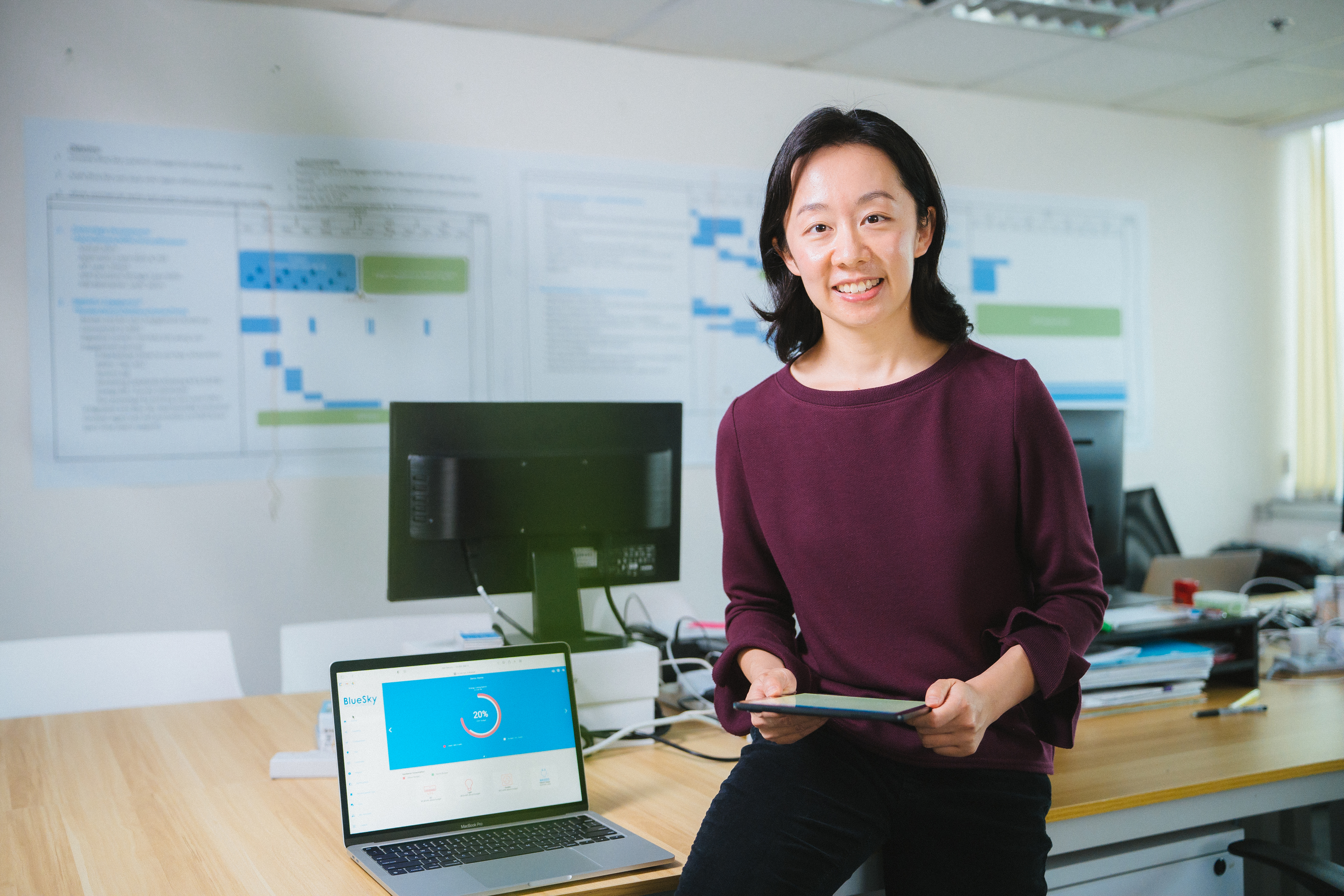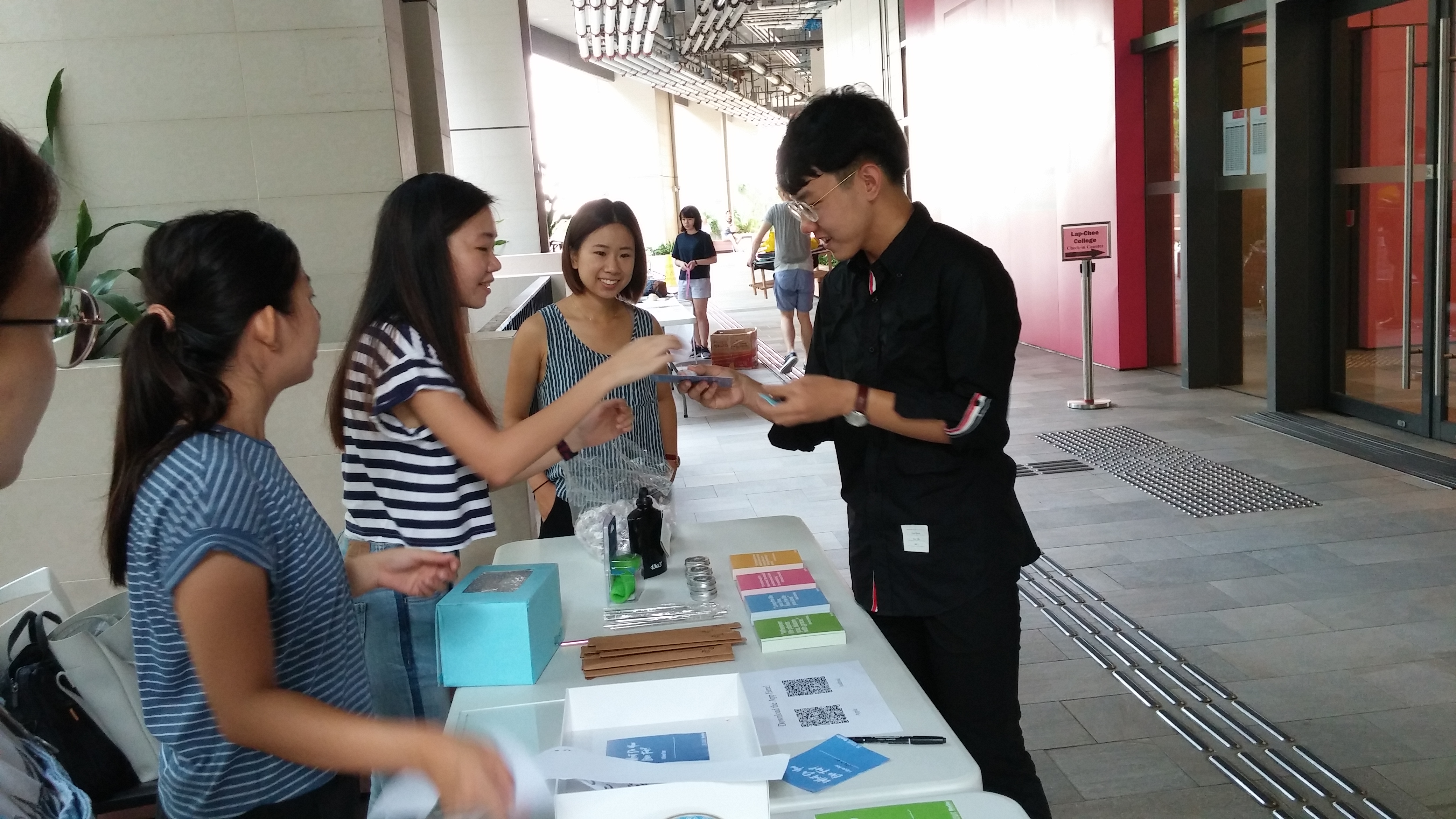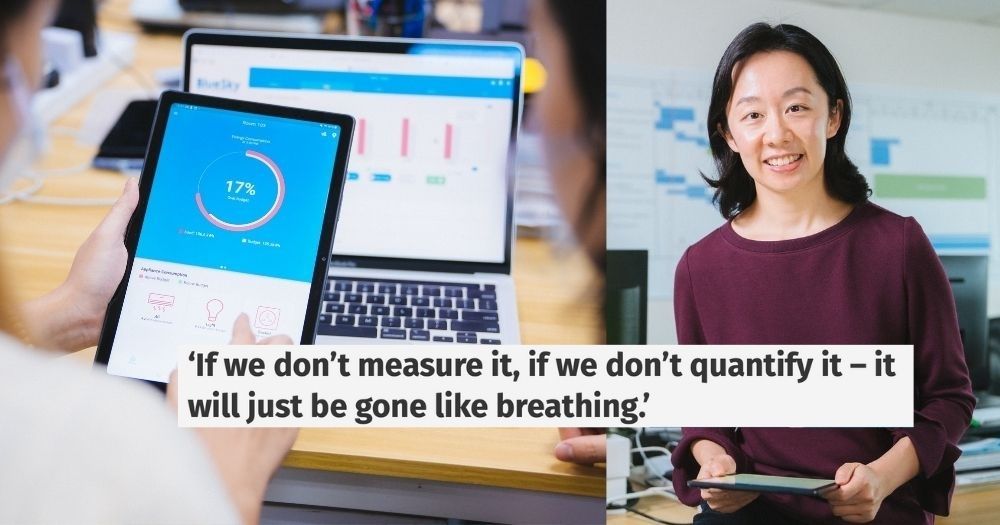Follow us on Telegram for the latest updates: https://t.me/mothershipsg
How much is one kilowatt hour?
Christina Tang quickly spells out the statistics off the top of her head: One kilowatt hour is equal to one hour use of a typical home aircon unit, equivalent to powering up 30 fans, or charging 102 iPhones.
As the founder of Blue Sky Energy Technology (Blue Sky), a start-up that provides energy management solutions, these numbers are second nature to Tang.
Quantifying energy used in an easy-to-understand manner is also at the core of how her Hong Kong-based company helps clients reduce energy costs and usage in their buildings.
Driving behavioural change to save energy
With the intention to provide environmental solutions, Tang started Blue Sky to tackle the large proportion of emissions that come from buildings.
"70 per cent of our city’s carbon footprint comes from buildings' electricity usage, and with Covid-19, we spend almost all of our time indoors," Tang told Mothership.
 Image by Blue Sky Energy Technology.
Image by Blue Sky Energy Technology.
Since Blue Sky started in 2014, it has saved 3,000 tonnes of carbon dioxide, which is equivalent to planting 40,000 trees by working with over 10,000 individuals.
Unlike other electrical engineering solution companies, the company has a strong focus in driving changes in behaviour to save energy.
“The technology is there, but the biggest challenge is the adoption of energy-saving habits,” said Tang.
Tang explained that while automation and hardware optimisation can help reduce energy consumption, they can only get you so far.
“Sometimes, when the building's facility management tries to do something, increasing the temperature setpoint by a degree for example, they receive complaints from their tenants saying ‘Why is it hotter?’, even though they are all wearing cardigans in the office.”
To tackle this gap between intention and action, Blue Sky proactively engages occupants in homes, offices and schools for them to take actionable steps to save energy.
Translating energy into tangible terms
Like Singapore, the city's readily available energy is largely taken for granted in Hong Kong.
To Tang, the solution lies in making energy “very real and concrete” to the public.
“If we don’t measure it, if we don't quantify it – it will just be gone like breathing. It's about providing people with a real concept of the consequences of their actions so that they know that their actions matter."
Tang found that citizens generally have a poor understanding about the amount of energy they use and the best ways to cut their energy usage.
Most importantly, they are unable to take accountability for their energy usage.
App tracks energy use
The company’s app, Blue Sky Dashboard, empowers users with the ability to track and reduce their energy usage.
In the office or at home, personalised smart energy sensors track the occupant's energy consumption, breaking it down into three types of energy use: air conditioning, lighting and power sockets.
The data is then displayed on the user-friendly app to help individuals to make more informed decisions about their energy usage.
Instead of presenting them in kWh, the app translates the energy use into hours of iPhone charges and the number of trees planted, and cost savings.
“By turning the aircon temperature up by a degree, you can save 20 per cent of energy," said Tang.
In a year, that’s planting nine real trees to offset the carbon dioxide emitted by your cooling energy.
On the app, users can also track their real-time energy use and view how they are faring in comparison to their peers.
 Image by Blue Sky Energy Technology.
Image by Blue Sky Energy Technology.
Users coming up with solutions themselves
The University of Hong Kong is one of the partners that Blue Sky has worked with, and the process is a collaborative one.
Blue Sky first helped over 1,800 students who lived in the university's dormitories recognise the amount of energy they consumed and the areas where they can cut down on energy use.
 Image by Blue Sky Energy Technology.
Image by Blue Sky Energy Technology.
Room-level sensors revealed that some hall residents consumed four times as much energy as others – which indicated that their energy usage was largely driven by their behaviour.
The data collected was then released to the students, who came up with the energy saving solutions themselves.
The students initiated a fan rental scheme which reduced air conditioning usage and some adopted a smart lighting system which uses 80 per cent less energy.
Other energy saving tips include combining the use of air conditioning with a fan, cleaning the air conditioning filters, and unplugging their mini-fridge over the holidays.
The pilot programme which started in 2016 has since expanded 20 times to cover 80 floors of student dorms. In total, the university students reduced their energy usage by 14 per cent.
 Image by Blue Sky Energy Technology.
Image by Blue Sky Energy Technology.
New rewards system for users
Blue Sky is also in the midst of creating a holistic sustainability rewards programme using the DBS Foundation Social Enterprise Grant they received in 2021.
“We also want to make it real and concrete by providing actual rewards, so users can buy green alternative products at a discounted price, or even [get them for] free if they have accumulated sufficient sustainable actions,” said Tang.
Users will be able to redeem products like compostable disposable utensils and eco-friendly detergent which can help them lead a greener lifestyle as well.
“By leveraging the reward and incentive scheme, we can make use of another behavioural change tool to engage and incentivise more of the public to participate. We know that climate change is still a very abstract concept, and we want to make it more relatable day to day.”
The programme aims to promote energy savings equivalent to 75 tonnes of carbon dioxide to at least 10,000 end users.
This article was made possible with the support of DBS Bank.
The 2022 DBS Foundation Social Enterprise Grant Programme is open for applications. Innovative social enterprises with solutions tackling the areas of social/environmental impact or “Zero Food Waste” are welcome to apply from now till May 31, 2022, 2359h.
Discover more about the DBS Foundation Social Enterprise Grant here.
Top photos via Blue Sky Energy Technology.
If you like what you read, follow us on Facebook, Instagram, Twitter and Telegram to get the latest updates.
